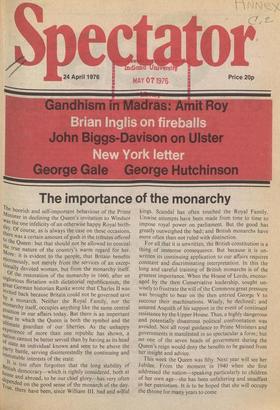The importance of the monarchy Th
boorish and self-important behaviour of the Prime minister in declining the Queen's invitation to Windsor dwas the one infelicity of an otherwise happy Royal birth, aY. Of course, as is always the case on these occasions, there was a certain amount of gush in the tributes offered the Queen : but that should not be allowed to conceal ne true nature of the country's warm regard for her. M ore: it is evident to the people, that Britain benefits e.n°1-inously, not merely from the services of an exceptionally devoted woman, but from the monarchy itself. . Of the restoration of the monarchy in 1660, after an inglorious flirtation with dictatorial republicanism, the great German historian Ranke wrote that Charles 11 was ibnvited back because Britain could not be governed save Y a monarch. Neither the Royal Family, nor the Inonarchy itself, occupies anything like the same central Position in our affairs today. But there is an important sein.se in which the Queen is both the symbol and the etlitimate guardian of our liberties. As the unhappy „xP.erience of .more than one republic has shown, a iloation cannot be better served than by having as its head r state an individual known and seen to be above the Iclarty battle, serving disinterestedly the continuing and nlinutable interests of the state. !t. is too often forgotten that the long stability of hiltish democracy—which is rightly considered, both at debnie and abroad, to be our chief glory—has very often ,ePended on the good sense of the monarch of the day. 'roe, there have been, since William Ill, bad and wilful kings. Scandal has often touched the Royal Family. Unwise attempts have been made from time to time to impose royal power on parliament. But the good has greatly outweighed the bad; and British monarchs have more often than not ruled with distinction.
For all that it is unwritten, the British constitution is a thing of immense consequence. But because it is unwritten its continuing application to our affairs requires constant and discriminating interpretation. In this the long and careful training of British monarchs is of the greatest importance. When the House of Lords, encouraged by the then Conservative leadership, sought unwisely to frustrate the will of the Commons great pressure was brought to bear on the then untried George V to succour their machinations. Wisely, he declined; and assured Asquith of his support in the event of continued resistance by the Upper House. Thus, a highly dangerous and potentially disastrous political confrontation was avoided. Not all royal guidance to Prime Ministers and governments is manifested in so spectacular a form; but no one of the seven heads of government during the Queen's reign would deny the benefits to be gained from her insight and advice.
This week the Queen was fifty. Next year will see her Jubilee. From the moment in 1940 when she first addressed the nation—speaking particularly to children of her own age—she has been unfaltering and steadfast in her patriotism. It iS to be hoped that she will occupy the throne for many years to come.


































